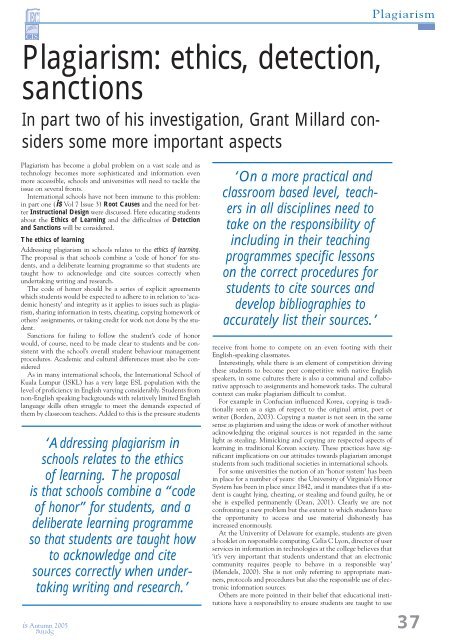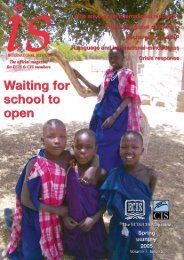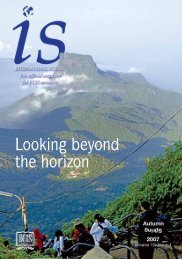is magazine 8.1 - Autumn/Spring 2005 - International Schools ...
is magazine 8.1 - Autumn/Spring 2005 - International Schools ...
is magazine 8.1 - Autumn/Spring 2005 - International Schools ...
You also want an ePaper? Increase the reach of your titles
YUMPU automatically turns print PDFs into web optimized ePapers that Google loves.
Plagiar<strong>is</strong>m: ethics, detection,<br />
sanctions<br />
In part two of h<strong>is</strong> investigation, Grant Millard considers<br />
some more important aspects<br />
Plagiar<strong>is</strong>m has become a global problem on a vast scale and as<br />
technology becomes more soph<strong>is</strong>ticated and information even<br />
more accessible, schools and universities will need to tackle the<br />
<strong>is</strong>sue on several fronts.<br />
<strong>International</strong> schools have not been immune to th<strong>is</strong> problem:<br />
in part one (<strong>is</strong> Vol 7 Issue 3) Root Causes and the need for better<br />
Instructional Design were d<strong>is</strong>cussed. Here educating students<br />
about the Ethics of Learning and the difficulties of Detection<br />
and Sanctions will be considered.<br />
The ethics of learning<br />
Addressing plagiar<strong>is</strong>m in schools relates to the ethics of learning.<br />
The proposal <strong>is</strong> that schools combine a ‘code of honor’ for students,<br />
and a deliberate learning programme so that students are<br />
taught how to acknowledge and cite sources correctly when<br />
undertaking writing and research.<br />
The code of honor should be a series of explicit agreements<br />
which students would be expected to adhere to in relation to ‘academic<br />
honesty’ and integrity as it applies to <strong>is</strong>sues such as plagiar<strong>is</strong>m,<br />
sharing information in tests, cheating, copying homework or<br />
others’ assignments, or taking credit for work not done by the student.<br />
Sanctions for failing to follow the student’s code of honor<br />
would, of course, need to be made clear to students and be cons<strong>is</strong>tent<br />
with the school’s overall student behaviour management<br />
procedures. Academic and cultural differences must also be considered<br />
As in many international schools, the <strong>International</strong> School of<br />
Kuala Lumpur (ISKL) has a very large ESL population with the<br />
level of proficiency in Engl<strong>is</strong>h varying considerably. Students from<br />
non-Engl<strong>is</strong>h speaking backgrounds with relatively limited Engl<strong>is</strong>h<br />
language skills often struggle to meet the demands expected of<br />
them by classroom teachers. Added to th<strong>is</strong> <strong>is</strong> the pressure students<br />
‘Addressing plagiar<strong>is</strong>m in<br />
schools relates to the ethics<br />
of learning. The proposal<br />
<strong>is</strong> that schools combine a “code<br />
of honor” for students, and a<br />
deliberate learning programme<br />
so that students are taught how<br />
to acknowledge and cite<br />
sources correctly when undertaking<br />
writing and research.’<br />
<strong>is</strong> <strong>Autumn</strong> <strong>2005</strong><br />
<strong>Spring</strong><br />
‘On a more practical and<br />
classroom based level, teachers<br />
in all d<strong>is</strong>ciplines need to<br />
take on the responsibility of<br />
including in their teaching<br />
programmes specific lessons<br />
on the correct procedures for<br />
students to cite sources and<br />
develop bibliographies to<br />
accurately l<strong>is</strong>t their sources.’<br />
receive from home to compete on an even footing with their<br />
Engl<strong>is</strong>h-speaking classmates.<br />
Interestingly, while there <strong>is</strong> an element of competition driving<br />
these students to become peer competitive with native Engl<strong>is</strong>h<br />
speakers, in some cultures there <strong>is</strong> also a communal and collaborative<br />
approach to assignments and homework tasks. The cultural<br />
context can make plagiar<strong>is</strong>m difficult to combat.<br />
For example in Confucian influenced Korea, copying <strong>is</strong> traditionally<br />
seen as a sign of respect to the original art<strong>is</strong>t, poet or<br />
writer (Borden, 2003). Copying a master <strong>is</strong> not seen in the same<br />
sense as plagiar<strong>is</strong>m and using the ideas or work of another without<br />
acknowledging the original sources <strong>is</strong> not regarded in the same<br />
light as stealing. Mimicking and copying are respected aspects of<br />
learning in traditional Korean society. These practices have significant<br />
implications on our attitudes towards plagiar<strong>is</strong>m amongst<br />
students from such traditional societies in international schools.<br />
For some universities the notion of an ‘honor system’ has been<br />
in place for a number of years: the University of Virginia’s Honor<br />
System has been in place since 1842, and it mandates that if a student<br />
<strong>is</strong> caught lying, cheating, or stealing and found guilty, he or<br />
she <strong>is</strong> expelled permanently (Dean, 2001). Clearly we are not<br />
confronting a new problem but the extent to which students have<br />
the opportunity to access and use material d<strong>is</strong>honestly has<br />
increased enormously.<br />
At the University of Delaware for example, students are given<br />
a booklet on responsible computing. Celia C Lyon, director of user<br />
services in information in technologies at the college believes that<br />
‘it’s very important that students understand that an electronic<br />
community requires people to behave in a responsible way’<br />
(Mendels, 2000). She <strong>is</strong> not only referring to appropriate manners,<br />
protocols and procedures but also the responsible use of electronic<br />
information sources.<br />
Others are more pointed in their belief that educational institutions<br />
have a responsibility to ensure students are taught to use<br />
Plagiar<strong>is</strong>m<br />
37




